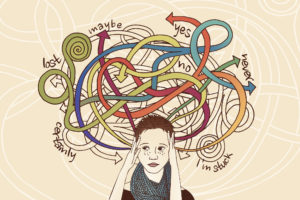“I need to be control of things.”
“I have to make sure I have all my bases covered all the time.”
“My gut is telling me that’s a bad idea.”
“If that goes wrong, it’ll be horrible.”
Everyday we walk around with underlying belief systems that affect how we behave, whether we are aware of them or not. Some of these are absolute (I assume that gravity will work today), some are open to discussion (raw fish tastes great). However, many thoughts we have go unchallenged that really should be further analyzed, like the ones listed about:
I need to be control of things
“If I’m not in control, something will go wrong, so I cannot cede control ever.”
I had one patient state “I would rather fly the plane, knowing that I would crash it, than let the pilot fly. That’s why I don’t fly: I can’t let someone else do things for me because they won’t do it the way I want.”
I have to make sure I have all my bases covered all the time
“The world is so dangerous, I have to be on alert at all times, and ANYTHING can happen.”
Most of our patients live in a relatively safe environment in Orange County: Irvine is consistently ranked as one of the safest cities in the US, with the areas around it being similar. Anything can happen, but do all low likelihood events need to be addressed? More often the worries around day-to-day concerns that don’t happen: being late to work means getting fired.
I rely on my gut to make decisions
“How I feel is as important as facts and data.”
While emotions should inform our decisions, they shouldn’t be relied upon to make decisions, especially when there is data that indicates otherwise. One patient was consistently worried that his wife was going to leave him when he felt that she was ‘distant’, even though she had repeatedly told him that the relationship was strong (they had been in a stable relationship for more than six years).
If that goes wrong, it’ll be horrible
“All outcomes that don’t turn out the way I want are intolerable and overwhelming.”
One person I working with was very regimented and orderly, causing problems with many of her friends and family. She would get upset if they were off schedule, and would get upset at her family if they got lost while on a road trip. When I mentioned something that my aunt had told me, (“Getting lost is great: it’s the best way to find new things you’d never otherwise know about.”), she didn’t know how to respond.
All of these thoughts aren’t necessarily bad in given situations, but when used as rules of thumbs for life they can lead to views of the world that are negative and scary. Metacognition, or thinking about our thinking, can often help us have a more balanced and realistic view of the world around us, as well as who we are.
